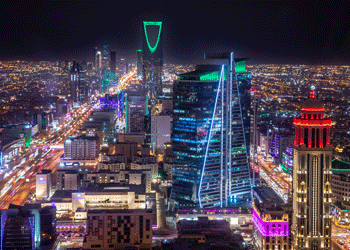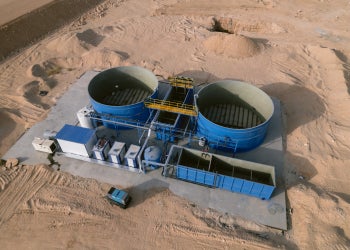More pain for more gain for Egypt
7 February 2024
 This package on Egypt also includes:
This package on Egypt also includes:
> UK and Egypt sign infrastructure agreement
> Familiar realities threaten Egypt’s energy hub ambitions
> Egypt nears fresh loan agreement with IMF
> ADQ and Adnec invest in Egypt hospitality group
> Egypt’s President El Sisi secures third term
> Egypt 2024 country profile and databank

Egyptian President Abdel Fattah El Sisi might have hoped for a honeymoon period after his resounding election win in December, but has enjoyed not a bit of it.
Egypt started 2024 with an economic crisis gaining in intensity, with events in the Red Sea – sharply reducing traffic through the Suez Canal – compounding other challenges, including a foreign currency (FX) shortage, a depreciating pound on the parallel market and rising inflation.
The president’s words on 24 January were ominous: “Egyptians need to live with economic pain,” he said, indicating that 2024 would be a tough year.
With Egypt’s economic crisis worsening by the week, the siren calls for a support package from the Washington-based IMF have grown ever louder. Expectations are high that a new and larger extended fund facility (EFF) is imminent, with IMF officials visiting Cairo in January to hammer out a deal.
Analysts have suggested the EFF – initially set at $3.9bn – could now be as high as $10bn-$12bn. This increase reflects the desperate situation that Egypt is in.
It is also a sign that Egypt still has a few cards left up its sleeve – not least amid the current crisis in the Middle East that has left it playing a vital role, however ineffectually, as the main conduit for aid deliveries into Gaza.
The Red Sea crisis and the desire to keep a dependable security partner in the region afloat are also factors.
“There is a bit more political willingness to support Egypt than a year ago,” says James Swanston, Middle East and North Africa economist at Capital Economics.
Economic precipice
The immediate backdrop to the renewed EFF negotiations is the sharp deterioration in the value of the pound after a bad 2023 that saw the official rate depreciate by 25% against the dollar.
By the end of January, the pound was trading at £E68-£E70 to the dollar, more than double the official rate of nearly £E30.9 to the dollar. Although the announcement of an imminent deal with the IMF in early February led the pound to rally to £E55 to the dollar on 4 February.
The fiscal headwinds are nevertheless increasingly fierce in 2024. With about 60% of its revenues absorbed by interest payments, according to ratings agency Moody’s, the government has very limited fiscal headroom to respond to such shocks. Cairo’s dilemma is that even if the EFF is raised to the upper limit of $12bn, it will only partially cover its financing needs.
Meanwhile, ratings agencies have been busy downgrading the sovereign. Fitch Ratings cut Egypt’s long-term foreign currency rating to B- from B, with a stable outlook, in November, reflecting its perception of heightened risks to Egypt’s external financing, macroeconomic stability and the trajectory of already-high government debt.
The slow progress on reforms, including the delay in the transition to a more flexible exchange rate regime, has damaged the credibility of exchange rate policy and exacerbated external financing constraints at a time of increasing external government debt repayments, said Fitch.
External financing stresses influenced the downgrading of Egypt, says Paul Gamble, director of the sovereign group at Fitch Ratings.
“There are FX challenges becoming apparent and also concerns over the availability of foreign currency. There are significant black-market transactions and FX shortages, signalling that downward pressures on the currency have increased, and the path to policy adjustment has become more complicated, at a time of high external debt repayments.”
One particular challenge facing Egypt is that Egyptian expatriate remission inflows from the Gulf states have declined, with many getting a better deal on the parallel market than through official channels.
Then there are the Suez Canal revenues, which government officials say fell by 44% in January compared to the same month in 2023.
“The revenue collections from the Suez Canal are a very stable source of income for Egypt, so the fact that they have been hit is a bit of a concern,” says Gamble.
“The impact on investor sentiment and the parallel market rates could further complicate the transition to a more flexible exchange rate. On the other hand, the IMF is talking about upsizing its assistance programme, and Egypt is getting more bilateral attention.”
Next steps forward
Assuming the EFF is finalised, attention will then switch to what comes next.
The strings attached to that package will be substantial, incurring both political and economic costs.
Fiscal policy will see more stringency, with sharp cutbacks on spending. Major projects may lose some support. Yet, while these projects are important for job prospects in Egypt, the IMF’s message is to keep fiscal policy tight for now.
More stringency on the privatisation drive is also on the menu. Under the country’s divestment programme for state-owned enterprises (SOEs), speculators suggest that up to 150 SOEs may be sold off. However, political sensitivities over the military’s footprint in many of these assets mean delays are possible.
The most important thing in the near term is dealing with the pound, which was in virtual free fall at the end of January, forcing banks to install limits on FX transactions.
According to Capital Economics, if a staff-level agreement is announced, the central bank would move swiftly to devalue the pound by an initial 23%, to £E40 to the dollar, before allowing it to freely float.
“We feel [a rate of £E40-£E43 to the dollar] is a natural level, and it should not result in a fresh inflationary spike, but rather, inflation will fall at a slower rate,” says Swanston.
It was suggested that this could coincide with a sharp hike in interest rates of at least 300 basis points (bps), to 22.25%, and indeed, on 1 February, the central bank went ahead with this, raising the deposit rate to 21.25% and the lending rate to 22.25%.
That said, higher-for-longer prices and a 300bps interest hike will be painful for businesses to absorb, while a weaker pound will also make imports more expensive.
Yet, for all the doom and gloom, there are some green shoots. Egypt’s GDP growth is stable, with Capital Economics forecasting GDP growth of 3.5% in 2024-25.
Tourism – a valuable source of hard currency – is another recent bright spot, with arrivals to Egypt rising 9% in year-on-year terms during the first 19 days of 2024.
Egypt’s tourism numbers, spiking at approximately eight times higher than the global tourism rate of 4.5%, have been pivotal in stimulating overall growth, says property consultancy JLL. Between January and October 2023, Egypt registered about 13.9 million tourist arrivals, almost 36% higher compared to the same period last year.
“This is the medicine [the country] needs to take to lay the foundations for unlocking the economy’s potential in coming years,” says Swanston.
“They have a couple of years of slow economic growth, but if you have got an orthodox policymaking framework with a flexible exchange rate, and you bring the debt ratio down, you can start going about actually taking advantage of very good demographics of a young population.”
There will be much pain in the interim. But the consensus is that staying the course will lead to better days.
Exclusive from Meed
-
 Solar deals signal Saudi Arabia’s energy ambitions
Solar deals signal Saudi Arabia’s energy ambitions13 February 2026
-
 Saudi Arabia appoints new investment minister
Saudi Arabia appoints new investment minister13 February 2026
-
 Indian firm wins major Oman substation contract
Indian firm wins major Oman substation contract12 February 2026
-
 Developers appoint contractor for $500m wastewater treatment project
Developers appoint contractor for $500m wastewater treatment project12 February 2026
-
 Dewa raises Empower stake in $1.41bn deal
Dewa raises Empower stake in $1.41bn deal12 February 2026
All of this is only 1% of what MEED.com has to offer
Subscribe now and unlock all the 153,671 articles on MEED.com
- All the latest news, data, and market intelligence across MENA at your fingerprints
- First-hand updates and inside information on projects, clients and competitors that matter to you
- 20 years' archive of information, data, and news for you to access at your convenience
- Strategize to succeed and minimise risks with timely analysis of current and future market trends

Related Articles
-
 Solar deals signal Saudi Arabia’s energy ambitions
Solar deals signal Saudi Arabia’s energy ambitions13 February 2026
 Commentary
Commentary
Mark Dowdall
Power & water editorSaudi Arabia’s recent agreement to build $2bn-worth of solar power plants in Turkiye is the latest sign that the kingdom’s energy influence is changing.
Historically, this was measured in oil barrels and export volumes. Increasingly, this is extending to capital, structuring expertise and the ability to deliver record-low tariffs in competitive markets.
Announcing the deal, Turkish Energy Minister Alparslan Bayraktar said tariffs for the plants would be the country’s lowest on record, with electricity purchased under 25-year power purchase agreements.
It followed another announcement, in January, that Acwa is investing $200m to build a large-scale solar photovoltaic (PV) plant in the Philippines.
Whether Saudi-backed companies ultimately retain long-term stakes or primarily develop and build the assets, their role at the front end is significant.
Sponsors that bring sovereign backing, clear procurement processes and access to low-cost financing can influence tariffs and contract terms from the outset.
There is also a geopolitical layer. Investing in Turkiye, or anywhere for that matter, strengthens political and economic ties at a time when regional alignments are shifting.
Energy infrastructure is also long-term by its nature. It connects ministries, regulators, lenders and operators in relationships that often extend well beyond a single transaction.
Saudi Arabia has spent the past few years refining its approach to pricing, structuring and financing large-scale renewables at home.
Exporting that expertise may not rival oil in scale or visibility, but it does signal that Saudi Arabia is becoming more than just an energy supplier.
Increasingly, it is becoming a participant in how other countries design and finance their energy transitions. That influence is still significant.
https://image.digitalinsightresearch.in/uploads/NewsArticle/15645903/main.jpg -
 Saudi Arabia appoints new investment minister
Saudi Arabia appoints new investment minister13 February 2026
Register for MEED’s 14-day trial access
King Salman Bin Abdulaziz Al-Saud has made a series of senior government changes, including Khalid Al-Falih leaving his role as investment minister to become minister of state and a member of the cabinet.
Al-Falih has been replaced by Fahad Al-Saif as investment minister. Al-Saif has been head of the Investment Strategy and Economic Insights Division at the Public Investment Fund (PIF) since 2024. That role involved formulating PIF’s long-term investment strategy. He has also served as head of the Global Capital Finance Division, a role he has held since joining PIF in 2021.
The change of investment minister comes at a time when securing investments has become a key priority for Saudi Arabia as it prepares to hand over more projects to the private sector for delivery.
King Salman also named Abdullah Al-Maghlouth as vice-minister of media and Abdulmohsen Al-Mazyad as vice-minister of tourism. Khalid Al-Yousef was named attorney general, and Sheikh Ali Al-Ahaideb will serve as president of the Board of Grievances.
Faihan Al-Sahli was selected as director general of the General Directorate of Investigation, while Abdulaziz Al-Arifi was chosen to lead the National Development Fund. Haytham Al-Ohali will head the Communications, Space and Technology Commission, and Fawaz Al-Sahli will chair the Transport General Authority.
https://image.digitalinsightresearch.in/uploads/NewsArticle/15645415/main.gif -
 Indian firm wins major Oman substation contract
Indian firm wins major Oman substation contract12 February 2026

India’s Larsen & Toubro has won a contract to build the Majan 400/220/132kV grid station in Oman.
Estimated to cost $100m, the project includes an associated 400kV line-in line-out underground cable from Sohar Free Zone to the Sohar Interconnector Station.
The contract was awarded by Oman Electricity Transmission Company (OETC), part of the government-owned Nama Group.
The grid station will comprise eight 400kV gas-insulated switchgear (GIS) bays, eight 220kV GIS bays and 10 132kV GIS bays at the new Sohar Free Zone substation.
The scope includes the installation of two 500MVA, 400/220kV transformers and two 500MVA, 220/132kV transformers.
Local firm Monenco Consulting Engineers was appointed in April last year to provide design and supervision services for the project.
As MEED exclusively revealed, the main contract was tendered in June, as part of three significant contracts to build new substations in the sultanate.
The second contract, worth about $35m, covers the construction of the Sultan Haitham City 132/33kV grid station and associated 132kV line-in line-out underground cables running 4 kilometres from Mabella to Mabella Industrial Zone.
The third contract, valued at about $100m, covers the construction of the Surab 400/33kV grid station and an associated 400kV line-in line-out cable from the Duqm grid station to the Mahout grid station.
Local firms Muscat Engineering Consulting and Hamed Engineering Services are consultants for the Sultan Haitham City and Surab projects, respectively.
The two remaining contracts are currently under bid evaluation, with awards expected this quarter.
https://image.digitalinsightresearch.in/uploads/NewsArticle/15638107/main.jpg -
 Developers appoint contractor for $500m wastewater treatment project
Developers appoint contractor for $500m wastewater treatment project12 February 2026

Register for MEED’s 14-day trial access
Egypt’s Orascom Construction has won the engineering, procurement and construction (EPC) contract for a major wastewater treatment project in Saudi Arabia’s Eastern Province.
A consortium of Saudi utilities provider Marafiq, the regional business of France’s Veolia and Bahrain/Saudi Arabia-based Lamar Holding is developing the $500m (SR1.875bn) industrial wastewater treatment plant (IWWTP) in Jubail Industrial City 2.
Sources close to the project confirmed the appointment to MEED, adding that the project has now entered the construction phase.
Industry sources also said that financial close on the project is expected to be reached in the coming days.
In September, the developer consortium was awarded a contract, under a 30-year concession agreement, by Saudi Aramco Total Refining & Petrochemical Company (Satorp), a joint venture of Saudi Aramco and France’s TotalEnergies.
The planned facility will treat and recycle wastewater from Satorp’s under-construction Amiral chemical derivatives complex, also in Jubail.
Marafiq, formally Power & Water Utility Company for Jubail and Yanbu, will own a 40% stake in the dedicated project company. Veolia Middle East SAS will hold a 35% stake, and Lamar Holding’s Lamar Arabia for Energy will hold the other 25%.
The planned IWWTP, which will primarily serve the $11bn sprawling Amiral chemicals zone, will implement advanced water treatment and recovery technologies to process complex industrial effluents, including spent caustic streams. Treated water will be reintegrated into the industrial processes, supporting closed-loop reuse and energy efficiency.
The project follows a concession-style model, akin to a public-private partnership (PPP), where the developer consortium invests in, builds and operates the wastewater plant over a 30-year period, with returns linked to service delivery.
Marafiq has been involved in several similar projects across Saudi Arabia, including as the sole owner of the Jubail industrial water treatment plant (IWTP8), which treats complex industrial effluents for petrochemical and heavy industrial companies.
In 2020, Saudi Services for Electro Mechanic Works was awarded the $202m main contract for the fourth expansion phase of IWTP8. Construction works on the project are expected to be completed by the end of the quarter.
 READ THE FEBRUARY 2026 MEED BUSINESS REVIEW – click here to view PDF
READ THE FEBRUARY 2026 MEED BUSINESS REVIEW – click here to view PDFSpending on oil and gas production surges; Doha’s efforts support extraordinary growth in 2026; Water sector regains momentum in 2025.
Distributed to senior decision-makers in the region and around the world, the February 2026 edition of MEED Business Review includes:
> AGENDA: Mena upstream spending set to soar> INDUSTRY REPORT: MEED's GCC water developer ranking> INDUSTRY REPORT: Pipeline boom lifts Mena water awards> MARKET FOCUS: Qatar’s strategy falls into place> CURRENT AFFAIRS: Iran protests elevate regional uncertainty> CONTRACT AWARDS: Contract awards decline in 2025> LEADERSHIP: Tomorrow’s communities must heal us, not just house us> INTERVIEW: AtkinsRealis on building faster> LEADERSHIP: Energy security starts with rethinking wasteTo see previous issues of MEED Business Review, please click herehttps://image.digitalinsightresearch.in/uploads/NewsArticle/15637523/main.jpg -
 Dewa raises Empower stake in $1.41bn deal
Dewa raises Empower stake in $1.41bn deal12 February 2026
Dubai Electricity & Water Authority (Dewa) has announced it has increased its stake in Emirates Central Cooling Systems Corporation (Empower) from 56% to 80%.
The transaction was completed through the purchase of 2.4 billion shares and the transfer of the entire ownership of Emirates Power Investment (EPI), which is wholly owned by Dubai Holding.
The total value of the deal is AED5.184bn ($1.41bn).
Empower currently holds over 80% of Dubai’s district cooling market and operates 88 district cooling plants across the emirate.
According to MEED Projects, the UAE’s district cooling sector currently has nine projects worth $1.29bn in the pre-execution phase.
Empower has ownership in four of these projects, which have a combined value of $472m.
This includes a $200 million district cooling plant at Dubai Science Park, with a total capacity of 47,000 refrigeration tonnes serving 80 buildings.
Empower signed a contract to design the plant last August, with construction scheduled to begin by the end of the first quarter of 2026.
The utility is also building a district cooling plant at Dubai Internet City.
UAE-based TMF Euro Foundations was recently appointed as the enabling and piling subcontractor for the project.
https://image.digitalinsightresearch.in/uploads/NewsArticle/15635949/main.jpg


